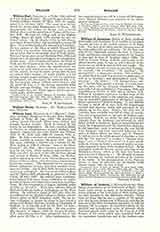

William of Auvergne, Bishop of Paris, medieval philosopher and theologian, b. at Aurillac in Auvergne towards the end of the twelfth century; d. in Paris, 1249. The date of his birth and the circumstances of his early education are unknown. In the first decades of the thirteenth century he went to Paris to study, and became successively teacher in the faculty of arts and in that of theology (about 1220). In 1228 he became Bishop of Paris, continuing, as his official decrees show, to take an active interest in the institution in which he had studied and taught. His works include several treatises on practical theology, for example, “De virtutibus”, “De moribus” “De sacramentis”, a dogmatic treatise “De trinitate” (in which there is much that pertains to philosophy as well as to theology), and philosophical works “De universo”, “De anima”, “De immortalitate animae”, the last being merely a rescript of a work bearing the same title by Dominic Gundisalvi. These were collected and published at Nuremberg, 1496, and republished at Venice, in 1591, and at Orleans, 1674. William of Auvergne represents the first stage of the movement which ended in the adoption and adaptation of Aristotle‘s philosophy as the basis of a systematic exposition of Christian dogma. It was difficult for him to break all at once with the Augustinian method and doctrine which had prevailed in the schools up to this time. Besides, the only text of Aristotle then available was full of errors of translation and of perversions on the part of Arabian commentators. Still he set about the task of rescuing Aristotle from the Arabians, and although he often failed to find a consistent basis of reconciliation between the Augustinian and the Aristotelean elements, he did important work in preparing the way for his more fortunate and more successful followers, Alexander of Hales, Albert the Great, and St. Thomas. He did not cover the whole ground of theology as they did; his “De universo” is neither a “Summa theologica”, nor a “Book of Sentences”; it is more specifically an attempt to found a science of reality on principles opposed to those of the Arabian School. In his theological works he devotes special attention to the Manichean heresy, which in his time had been renewed by the Cathari (q.v.). He devoted attention also to refuting the Arabian doctrine of the eternity of the world. In his interpretation of the Platonic theory of ideas he identifies the intelligible world (Kosuos Noetos) with the Son of God.
WILLIAM TURNER

